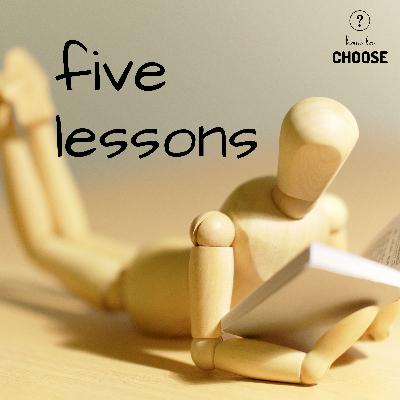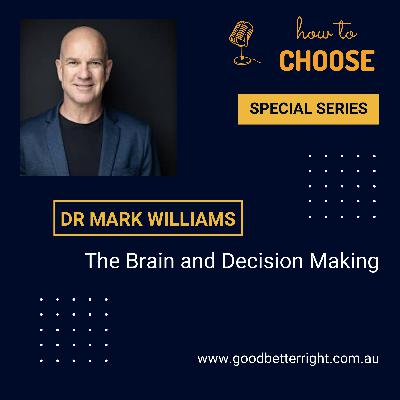Discover How to Choose
How to Choose

How to Choose
Author: Ken Smith & Tessa Mudge
Subscribed: 11Played: 49Subscribe
Share
© Ken Smith & Tessa Mudge
Description
How to Choose aims to help you make better decisions and judgments. We explore the science and theories of decision making and discuss how to apply this to the many decisions - both large and small - that we have to navigate every day.
51 Episodes
Reverse
In this episode we look at five lessons from the book 'Left Brain, Right Stuff: How Leaders Make Winning Decisions’ by Phil Rosenzweig. Rosenzweig challenges the assumption that the various biases and heuristics observed by behavioural economists such as Daniel Kahneman will automatically apply in all other arenas of life - and instead tries to demonstrate that the reality is more subtle. But Tess isn't fully convinced by some of Rosenzweig's arguments. What do you think?
In this, our 50th episode, we chat with champion ultra trail runner Patricia McKibbin about the extraordinary world of competitive trail running and get some great tips on how to persevere when times get tough.Inspired by Trish's stories? You can follow her on Instagram - https://www.instagram.com/trishmckibbin/
In episode 8 of season 5, we discuss the attribute of perseverance and why it is important for good decision making. Decision making can be hard work - unless we persevere, we risk settling for a poor choice. And having made that decision, we need perseverance to turn our good choice into a good outcome.If you're interested to learn more about this topic, you might want to grab the book 'Grit' by Angela Duckworth.The full interview with champion trail runner Patricia McKibbin is available as a bonus episode - make sure you check it out!
In episode 7 of season 5, we discuss the attribute of being reflective and why it is important for good decision making. And also why it’s essential for success in life more generally.WHAT TO DO?You can enhance your reflection by:schedule regular time to reflectask yourself specific questions and consider getting an outside perspectivereflect on your successes too, not just when things go wrongLINKSWant to learn more about developing your reflective ability? Here's links to some interesting articles: Research on reflectionhttps://www.ncbi.nlm.nih.gov/pmc/articles/PMC3167369/https://www.sciencedirect.com/science/article/pii/S2405844022011525https://papers.ssrn.com/sol3/papers.cfm?abstract_id=2414478Harvard Business Review question prompts: https://hbr.org/2017/03/why-you-should-make-time-for-self-reflection-even-if-you-hate-doing-itWhat are you avoiding? How are you helping your colleagues achieve their goals? How are you not helping or even hindering their progress?IN OUR NEXT EPISODE...In episode 8 of this season, we'll be discussing the importance of ‘perseverance’ when it comes to making important decisions. Don't miss it!
Heraclitus famously said ‘change is the only constant in life’. We change - as we mature and age - and the world around us is constantly changing. Sometimes we are drivers of change, based on the choices we make. Sometimes change happens to us whether we like it or not. By being adaptable, we can navigate through our changing environment, learning from our mistakes and maximising our chances of achieving our goals.LINKShttps://www.forbes.com/sites/forbesbooksauthors/2023/03/13/adaptability-the-secret-sauce-of-leadership/?sh=1c32708e42daHodges, J., & Gill, R., (2015). Kodak: Reacting to core market changes. In Sage Business Cases. SAGE Publications, Ltd., https://doi.org/10.4135/9781526405340Tim Harford, ‘Adapt: Why Success Always Starts With Failure’ (Picador)
In episode 5 of season 5, we discuss the attribute of having courage and why it is important for good decision making. WHAT TO DO?You can enhance your own or your organisation’s courage by:leaving your ego at the doorspeaking less and listening moreencourage dissent and admit when you are wrongdeliberately seek out information, with an open mindLINKSWant to learn more about becoming more courageous? Here's links to some interesting articles:1. TEDx: https://www.youtube.com/watch?v=CopAQ88_QfY 2. When leaders heed the lessons of mistakes: https://onlinelibrary.wiley.com/doi/full/10.1111/peps.125703. Conducting a pre-mortem: https://hbr.org/2007/09/performing-a-project-premortem IN OUR NEXT EPISODE...In episode 6 of this season, we'll be discussing why it is beneficial to be ‘adaptable’ when it comes to making important decisions. Don't miss it!
In episode 4 of season 5, we discuss the attribute of being knowledge hungry and why it is important for good decision making. WHAT TO DO?You can enhance your hunger for knowledge by:reading every day, channel Warren Buffetdeliberately seek out information, with an open mind, being open minded is key, otherwise all that new knowledge is not informing your decisionsthink like a scientist: accept how little you know and form hypotheses, run experiments, and consistently rethink your understanding of the world LINKSWant to learn more about becoming more knowledge hungry? Here's links to some interesting articles:https://www.entrepreneur.com/leadership/25-surprising-facts-about-warren-buffett/290381https://adamgrant.net/book/think-again/https://papers.ssrn.com/sol3/papers.cfm?abstract_id=2319992IN OUR NEXT EPISODE...In episode 5 of this season, we'll be discussing why it is beneficial to be ‘reflective’ when it comes to making important decisions. Don't miss it!
In episode 3 of season 5, we discuss the attribute of realistic optimism and how it helps us be better decision-makers. SUMMARYRealistic optimism accepts the reality - both good and bad - of every situation, but applies a positive attitude to make the best of the situation and pursue our goals with energyPessimism isn't the same as realism. Pessimism focuses on unlikely negative outcomes and ignores the statistical likelihood that something bad will happen. Being sceptical means not accepting things on face value - it is a questioning, curious mindset that serves us better than pessimismWe can build realistic optimism by applying the ABC framework to analyse how we respond to adversity, adjusting our beliefs to support a more constructive decision that produces better consequences that help us achieve our goalsRESOURCESCurious to learn more about realistic optimism? Here's the details of some interesting articles:https://www.forbes.com/sites/forbescoachescouncil/2021/01/07/how-to-incorporate-realistic-optimism-into-your-life/?sh=24d6696876f0 Carver, Charles S., Michael F. Scheier, and Suzanne C. Segerstrom. “Optimism.” Clinical Psychology Review 30, no. 7 (2010): 879–89. https://doi.org/10.1016/j.cpr.2010.01.006.Jefferson, Bortolotti & Kuzmanovic, ‘What is Unrealistic Optimism?’, Consciousness & Cognition, 50 (2017)Martin Seligman, ‘Learned Optimism: How to Change Your Mind and Your Life’ (Vintage Books; New York, 1990)Are you, or someone you know, negatively impacted by gambling? Here's a couple of links that might help:https://www.gamblinghelponline.org.au/https://www.helpguide.org/articles/addictions/gambling-addiction-and-problem-gambling.htm IN OUR NEXT EPISODE...In episode 4 of this season, we'll be discussing the benefits of being 'knowledge-hungry'. Don't miss it!
In episode 2 of season 5, we discuss the attribute of purpose and why it is important for good decision making. And also why it’s essential for success in life more generally.WHAT TO DO?You can enhance your purpose by:setting short and medium term goals to keep you on track towards your bigger, purpose-driven goals, like being fit and healthyencouraging intrinsic motivation in others by asking questions like “how did you grow today and what do you need for tomorrow?” rather than “what did you achieve today?”in the workplace, when decision-makers understand the organisation’s purpose, they can best evaluate and make a decision based on how well it contributes to the purpose LINKSWant to learn more about developing your purpose? Here's links to some interesting articles:https://pubmed.ncbi.nlm.nih.gov/18999339/https://positivepsychology.com/increase-intrinsic-motivation/https://www.litcharts.com/lit/outliers/chapter-3-the-trouble-with-geniuses-part-1IN OUR NEXT EPISODE...In episode 3 of this season, we'll be discussing why it's beneficial to be ‘realistically optimistic’ when it comes to making important decisions. Don't miss it!
In this episode we chat with Kirsten Siggins and Kathy Taberner, co-authors of 'The Power of Curiosity'. You can find out more about their work at www.instituteofcuriosity.com or follow them on LinkedIn (https://www.linkedin.com/in/kirstensiggins/) and Instagram (https://www.instagram.com/instituteofcuriosity/).
In episode 1 of season 5, we discuss the attribute of curiosity and why it is important for good decision making. You'll also hear a short excerpt from our interview with Kirsten Siggins and Kathy Taberner - the full interview is available as a bonus episode.WHAT TO DO?You can enhance (or revive) your innate curiosity by:asking questions (don't let your pride quench your curiosity)getting outside and redeveloping a sense of wonder at the amazing world we live inidentifying gaps in your knowledge - acknowledging what we don't know can help us to be curiousunderstanding that curiosity will uncover some interesting options that you might never have otherwise considered LINKSCurious to learn more about curiosity? Here's links to some interesting articles:https://www.bbc.com/worklife/article/20220831-curiosity-the-neglected-trait-that-drives-success https://greatergood.berkeley.edu/article/item/six_surprising_benefits_of_curiosity https://www.ncbi.nlm.nih.gov/pmc/articles/PMC4635443/ IN OUR NEXT EPISODE...In episode 2 of this season, we'll be discussing why it is beneficial to be 'purposeful' when it comes to making important decisions. Don't miss it!
Five lessons from two-time world debating champion Bo Seo's book 'Good Arguments'
In this episode we chat with Dr Patrick Kilcarr, a psychologist and adjunct professor at Georgetown University in Washington D.C. and author of the book ‘Leading an Emotionally Intelligent Life’. He covers so many different topics, including choosing to heal, and how our mindset can change our perception of things.Once we make the decision we want to grow, change or heal, we need to commit ourselves to some honest self-reflection, as Dr Kilcarr says in his book, ‘self reflection is the cornerstone of self-correction’.Find out more about Dr Kilcarr's work here: https://www.eitrainingcompany.com/eq-i/https://theeilife.com/patrick-kilcarr/
In this interview, we chat with Erin Longmoon, CEO of employment company Zephyr Connects, about the process of selecting a new employee or new employer. Erin encourages us not to settle for second best when it comes to choosing a job. Erin also gives some tips on how to identify what a company or individual's real values are and explains why the social-emotional component of a workplace is so important.If you want to learn more and grab some more tips, check out Zephyr Connects' website - https://www.zephyrconnects.com (You can also find Erin on LinkedIn)
In this interview, we chat with coach Sarah Burrows. She focuses on helping her clients manage career shifts, and she shares some great insights about her own decision making journey too. Lots of tips for anyone contemplating taking a leap out of their current role.If you want to learn more, check out Sarah's website - https://www.achievingambition.com/. You can also follow Sarah on Instagram @achievingambition_
In this interview, we chat with personal trainer, physical therapist, Iron Man competitor and all-round nice guy Dr Chris Boettcher about turning our health and fitness goals into results. As well as sharing some fitness hacks, Chris talks about his own life journey and his decision to leave his job as a physical therapist to pursue his passion project. Chris talks about the trick of 'stacking bricks' to achieve big goals, and explains his mantra of 'don't miss twice'. If you want to learn more, check out Chris's website - www.brother2brotheru.com. You can also follow Chris on Twitter (or 'X') - @chrisboettcher9
In this episode we chat with amazing percussionist, music teacher and author of the book 'How to Get Good', Tsoof Baras. We talk about how, having made the decision that we want to improve at something, we actually see that improvement manifested.You can listen to Tsoof's music, find out more about him and buy his book through his website www.tsoofbaras.comIf you're enjoying the show, make sure to subscribe and drop us a review on your favourite podcast player!Thanks!Ken & Tess
This is the final part of a mini-series of three episodes in which we chat with Australian neuroscientist Dr Mark Williams. Dr Mark highlights why we should never stop learning, a lesson we live and breathe here at How to Choose! There are no more excuses that we’re just too old to learn something new. Old brains aren't less plastic, any difference is due to inactivity, not ageing. And finally he explains why socialising is one of the best things we can do for our brain.Like to know more about Dr Mark? Visit Dr Mark's website - www.drmarkwilliams.com where you can pre-order his new book 'The Connected Species' . Keen to dig deeper? A study of 27,000 people found that the earlier kids get smartphones the worse their mental health as adults. Check out 'Memory' by Lisa Genova.Like what you're hearing? If so, we'd be most grateful if you could take two minutes and drop us a rating and review on your podcast player. Thanks!
This is part 2 of a mini-series of three episodes in which we chat with Australian neuroscientist Dr Mark Williams. Dr Mark explains how mirror neurons work, and how essential they are, scientists actually think this is how babies learn to talk! So when speaking to your baby, face them so they can see how your lips move.Every time we get distracted we 'task switch', there's really no such thing as multitasking. Every time you check a notification on your phone you lose time having to go back and refocus on your previous task. Even the ding is enough to get you to task switch, you don’t even have to check it! So turn off those notifications so you can stop being busy and start getting things done.Like to know more about Dr Mark? Visit Dr Mark's website - www.drmarkwilliams.com where you can pre-order his book 'The Connected Species'. And make sure you tune in for episode 3 of this fascinating discussionLike what you're hearing? If so, we'd be most grateful if you could take two minutes and drop us a rating and review on your podcast player. Thanks!
This is part 1 of our interview with neuroscientist Dr Mark Williams. Dr Mark shares his remarkable transformation from an angry student whose principal thought he'd end up dead or in prison to a professor of neuroscience. He takes us on a lightning tour of the parts of the brain involved in decision making and describes the remarkable way our brain presents us with an illusion of the world around us. Like to know more about Dr Mark? Visit Dr Mark's website - www.drmarkwilliams.com where you can pre-order his new book 'The Connected Species'. And make sure you tune in for episodes 2 and 3 of this fascinating discussionKeen to dig deeper? Check out https://www.youtube.com/watch?v=KMQIuLQG09o for a really nice, simple video, 20 minutes in length, that explains the body's fight-flight response. This introduces you to the roles of the amygdala, hippocampus, hypothalamus, autonomic nervous system/sympathetic nervous system, adrenal gland (and the hormones norepinephrine, adrenaline and cortisol) and the cortex with some nice diagrams.Like what you're hearing? If so, we'd be most grateful if you could take two minutes and drop us a rating and review on your podcast player. Thanks!







